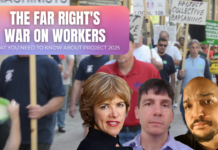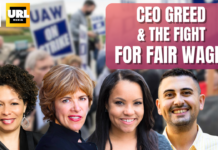A special thanks to our Patreon community for supporting us through this difficult time and making it possible to keep this content free for everyone.
New York State might have “flattened the curve,” but the country’s largest metropolitan area is still grappling with the effects of the coronavirus. Neighborhoods with many low-income residents have been hit disproportionately hard, and people of color are twice as likely to die from Covid-19. Kelley Cabrera is a registered nurse at the Jacobi Medical Center in the Bronx, where she is also the president of the labor bargaining unit for the NY State Nurses Association (NYSNA). She joins Dr. Frank Proscia, president of the Doctors Council, to discuss the challenges resulting from New York State’s lack of preparedness as well as the positive impact labor unions have had in advocating for front line workers. This conversation was produced by CITY WORKS, a project of the School of Labor and Urban Studies at the City University of New York and CUNY TV.
Cabrera and Proscia point out that our healthcare systems were not built to support the kinds of efforts we need to combat the Covid-19 pandemic. Years of fiscal restraint have left us ill equipped to deal with both the physical and economic effects of the coronavirus. We’re continually told that catastrophes of this magnitude are once-in-a-lifetime events, but Dr. Proscia cautions that the reality is that they are likely to happen more frequently. The question then becomes, what changes can we make to mitigate the costs, both in lives and money, of the next one?
Frontline workers have been vocal in asking for more protections and reform. Unions like NYSNA and SEIU have been a powerful force, demanding certain protections for healthcare workers, but more is needed.
Click here to watch more from our Forward Thinking on Covid-19 series, and don’t forget to subscribe to our newsletter to get the latest episodes delivered right to your inbox!
















